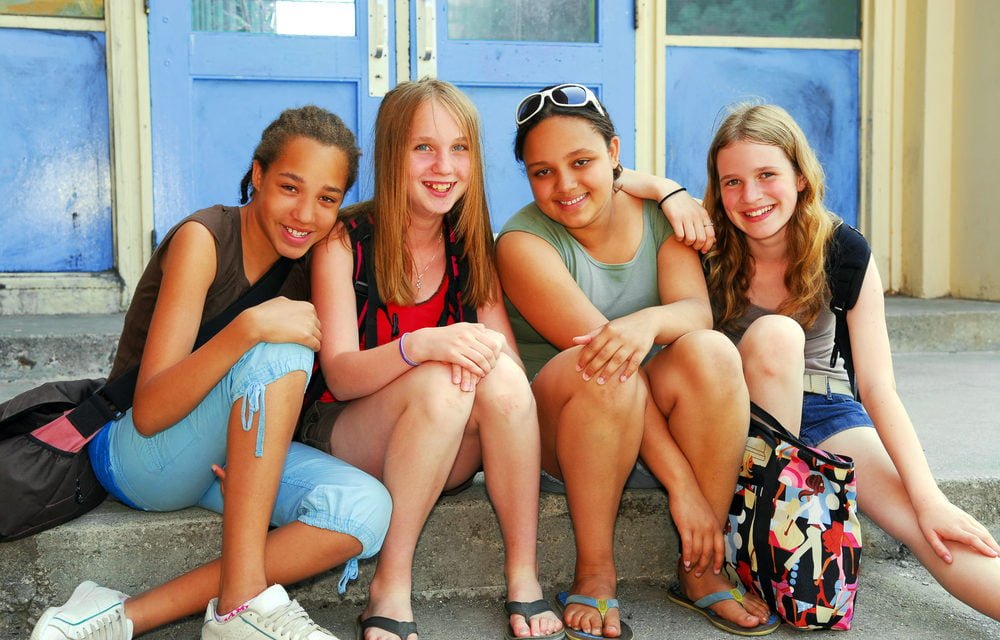The transition to high school can be daunting. How do you prepare your child? Here are some practical ways to help make the process smooth and painless.
The end of the school year is exciting for most of us. Holidays to look forward to, long sleep-ins and time with our friends and family. But not for everyone.
Across the road from me lives one of the most charming 12 year-olds I’ve ever known. I’ve watched her grow from a tulle-clad little angel of 3, to the 5’7” athlete she is now. She’s starting high school next year and she is not pleased.
The biggest problem is the bus to school. Who is she going to sit next to? To you and I, that might sound trivial and it’s easy to be dismissive, but for her it is terrifying.
What’s worse is that she is worried about the bus because she can’t even contemplate actual school yet. All those new people and she doesn’t know any of them. Most of her friends are going to other schools. She doesn’t know the teachers and there is a high chance she is going to get lost.
This fear of a new school is pretty normal, especially starting high school. Popular culture doesn’t exactly paint high school as a friendly, inclusive environment. So how do we counter this perception and guide kids through this transition?
1. Talk about the new school positively
Sometimes, with all the best intentions we make high school frightening for our kids. We say things like, “You’ll need to work harder than that in high school” or “They won’t put up with that in high school”.
High school is a natural progression in education. There isn’t a sudden, unreasonable jump in expectations, academically or socially. In fact, to some degree, the beginning of Year 7 is a bit of a recap while teachers figure out where students are in their learning.
Tell stories about your high school days, emphasising the good things like friends and great teachers. Make is real for them. Don’t list the benefits, kids know when you are selling an idea to them. Focus instead on sharing the positive emotions and stories you have when you reminisce about high school.
2. Make the school a familiar place
When starting at a new school, it helps if the school is somewhat familiar. If there are school tours available, take kids with you to have a look. You may want to attend drama productions or fairs or any school events that allow access to the community. Of course, Orientation Day is a must.
3. Be organised
Get uniforms and books sorted out early. There is so much about going to a new school that kids can’t control. Help them control the elements they can. That said, maybe don’t pull the trigger on the new uniform if there is a growth spurt in progress. One of my friends bought her daughter the new school uniform in December and it didn’t fit on the first day. That caused a bit of stress!
4. Teach them to be organised
One of the most daunting aspects of high school is moving from classroom to classroom and using a locker, instead of having one room for the whole day. Kids fear getting lost and not having the right books for the right class. There is also the complication of those combination locks that just never seem to play nicely.
In the lead up to high school, start to increase chores and tasks that require more planning and organisation. They should be packing their own equipment for after-school sports and activities and scheduling their own homework and project tasks. Family whiteboards or calendars where everybody is responsible for writing in their own commitments and events are also a good idea. Organisation skills will mean the change in school structure will be less confronting.
5. Talk about friends
Help kids recognise that they will find their tribe at high school. They need to be realistic and recognise that it takes a while to make good friends but they will have lots of new acquaintances straight away. Orientation programs and camps at the beginning of the school year ensure they will get to know the other kids. There is no point getting straight into academics if kids don’t feel as though they belong or feel comfortable.
A few hints about friends to pass on to kids, if they need them:
1. It is easier to make friends with individuals than with a group, so often having a chat in class or on the bus is more productive than trying to sidle up cold to a group in the yard.
2. Being friendly and interested and making eye contact are important. There’s nothing worse than talking to someone who is scanning the room looking for someone more interesting or who has more status. So be present.
3. People are attracted to people who are genuine. Don’t try to be something you’re not.
4. It’s not all about you. Listen when others speak. Find out about what other people like talking about and doing.
5. Take a risk and make the first move. Say hello.
Parents can help by making your home a place where your child can invite their new or potential friends and feel comfortable.
5. Keep the rest of life normal
When kids are going through a big change like a new school, if possible, keep everything else fairly routine. Sports teams, hobbies and favourite activities should all carry on as usual. Even if you have moved towns, rely on your family rituals and routines. These are the things that make kids feel secure and connected. They help us too.
Make time for kids to connect with their old friends from their old school. It will be reassuring, but also, when kids have friends in different groups and environments it takes the pressure off all their school relationships. School can be intense and with digital connectivity, kids can be too connected to what happens at school. It’s nice for them to have friends away from school
Finally…
When I talk to my young neighbour about starting high school I wonder whether she is afraid of the unknown, or afraid of losing the comfort of what she knows and loves. Either way, it’s uncomfortable. This discomfort is normal and kids don’t need to push it down or ignore it.
Encourage them to talk about it and be with it. Name it up…fear, frustration, grief, loss, loneliness. They are normal human feelings and they don’t have to be chased away. Just acknowledge them and accept them as normal. Those feelings will pass. The good thing about change is that it also brings the possibility of growth and excitement and joy.
Linda would love to meet you on her Facebook page here









